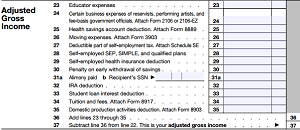Welcome to the end of the week and another edition of Happy Hour! Just sit back, relax, and enjoy your end of the week roundup of all things interesting in the land of money.
Stagnation
The Tax Foundation released its summary of federal income tax data. It’s a jumble of tables, numbers and percentages that show a major issue – income stagnation. Even though income and taxes increased for the year in question.
Over the past decade, income has been relatively stagnant. Meaning it just kept up with inflation, nothing more. Which you can speculate as a contributing factor to the excessive debt taken out during that same period. Which isn’t a good thing. Our economy requires two things to grow – lower unemployment and higher wages. The former is slowly improving, the latter needs some help.
Getting Better
Charlie Rose interviewed Warren Buffett and Carol Loomis this past Monday. The first few minutes Warren pushes his higher taxes agenda. But it gets better after, covering past and present topics. As usual, it’s a 54 minute lesson filled with a wealth of insight for anyone looking to invest. One thing to note, after the dismal topic above, even Warren believes the economy is getting better. Continue Reading…
 Your modified adjusted gross income or MAGI is used to determine your eligibility on a number of things. This includes several credits and deductions, Medicare Plan B premiums, and is most known for determining IRA deduction and Roth IRA contribution eligibility.
Your modified adjusted gross income or MAGI is used to determine your eligibility on a number of things. This includes several credits and deductions, Medicare Plan B premiums, and is most known for determining IRA deduction and Roth IRA contribution eligibility. There has been a flurry of special dividend announcements recently. Many from companies that don’t normally pay a dividend. Which shouldn’t be surprising really. Which leaves shareholders with a nice end of the year dividend payment. Of course, even special dividends are taxed. But how is it viewed for tax purposed?
There has been a flurry of special dividend announcements recently. Many from companies that don’t normally pay a dividend. Which shouldn’t be surprising really. Which leaves shareholders with a nice end of the year dividend payment. Of course, even special dividends are taxed. But how is it viewed for tax purposed? There are many ways to invest in foreign companies. International funds are the most common. But what about individual stocks? An ADR is an easy way to buy foreign stocks through your broker.
There are many ways to invest in foreign companies. International funds are the most common. But what about individual stocks? An ADR is an easy way to buy foreign stocks through your broker.